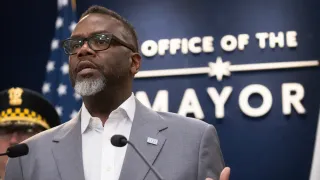
Aug 5
Trump Weighs Pardon for George Santos as Marjorie Taylor Greene Urges Clemency
READ TIME: 3 MIN.
George Santos, the former New York Congressman and one of the few openly gay Republicans to serve in the U.S. House, was sentenced in April 2025 to 87 months in federal prison after pleading guilty to wire fraud and aggravated identity theft. The charges stemmed from allegations that Santos misused campaign funds, fabricated key elements of his biography, and deceived donors and constituents. As part of his plea deal, Santos agreed to pay nearly $374,000 in restitution and additional penalties totaling approximately $580,000, a resolution that followed his ousting from Congress in late 2023 after a House vote amid mounting federal charges and public scrutiny.
Santos’ conviction and sentencing resonated throughout the LGBTQ+ community, which has been both critical of his actions and mindful of the unique challenges faced by LGBTQ+ individuals in the political sphere and the criminal justice system. Santos himself raised concerns about safety for gay men in federal custody, citing the risks and disparities faced by LGBTQ+ people in prison environments.
The prospect of presidential intervention escalated in recent weeks. Marjorie Taylor Greene, a Georgia Republican known for her support of Trump and her divisive rhetoric, issued a public letter to the Trump administration urging a commutation of Santos’ sentence. Greene argued that Santos’ seven-year prison term for non-violent, campaign-related offenses was excessive for a first-time offender and emphasized his expressed remorse and acceptance of responsibility. "I wholeheartedly believe in justice and the rule of the law, and I understand the gravity of such actions," Greene wrote. "However, I believe a seven-year sentence for such campaign-related matters for an individual with no prior criminal record extends far beyond what is warranted".
Trump, who is currently running for president, has publicly acknowledged Santos’ appeals for clemency. In interviews and statements, Santos described his outreach to Trump for a pardon, expressing hope for any form of relief, including a commutation or clemency. “I’ll take a commutation, a clemency, whatever the president is willing to give me,” Santos said in an interview with Piers Morgan.
Trump’s public comments have stopped short of a definitive promise, but he has reportedly signaled sympathy for Santos, noting the former congressman’s loyalty to him and the Republican Party. As of this reporting, no formal action has been taken.
The calls for clemency have triggered polarized reactions in political and LGBTQ+ circles. Advocates for accountability argue that Santos’ actions—misleading donors, fabricating his background, and betraying the trust of constituents—demand a strong judicial response, regardless of his sexual orientation or party affiliation. Some LGBTQ+ organizations have emphasized that public trust in LGBTQ+ elected officials is essential to advancing equality and representation, and that holding leaders accountable for misconduct is vital to the movement’s credibility.
Others, however, have pointed to the unique risks faced by LGBTQ+ people in the criminal justice system. Santos himself spoke publicly about concerns for his safety as a gay man entering federal prison, noting the disproportionate rates of violence and discrimination faced by LGBTQ+ individuals in custody. "The statistics around what happens to gay men in BOP custody are horrifying," he wrote on social media, adding that he wanted to ensure his supporters were aware of the dangers he could face.
Some LGBTQ+ legal advocates have urged reforms to ensure safer conditions for incarcerated transgender and queer people, regardless of their convictions, while simultaneously insisting that representation must not shield anyone from accountability.
As the debate continues, the intersectionality of identity, justice, and political loyalty remains at the forefront. The Santos case raises broader questions about the treatment of LGBTQ+ individuals in the criminal justice system, the responsibilities of public officials, and the power dynamics underpinning executive clemency.
For now, Santos remains in federal custody, awaiting word on any potential action from Trump. Marjorie Taylor Greene’s advocacy adds further political pressure, highlighting ongoing rifts within the Republican Party and the national conversation about justice, redemption, and the role of identity in American public life.






